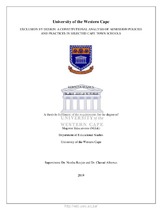Exclusion by design: A constitutional analysis of admission policies and practices in selected Cape Town schools
Abstract
School admission policies are powerful tools that can sometimes contain provisions that are in conflict with the Constitution of the Republic of South Africa and other legislation and policies which regulate education in South Africa. Provisions relating to fees, documents required for admission and specific admission practices may have the effect of excluding certain learners from admission to schools. Such practices include charging application fees, charging registration fees, administering admission tests and demanding only specific documents for proof of address. On the face of it, these practices may seem unproblematic, but in effect, they exclude certain learners. This may be contrary to South African Law. Section 36 of the Constitution allows for the limitation of rights. Differentiation or discrimination may be permissible; however, it is unfair discrimination that is prohibited. Consequently the constitutionality of these policies and practices investigated are measured against the protection afforded by the Constitution. This study identifies some of these exclusionary provisions and practices at schools and proposes possible ways to eradicate and combat them.
Because the exclusion of learners, whether through school admission policies or practices, may unjustifiably encroach upon the rights of such learners, this is an investigation into a legal issue and a legal theoretical lens must, therefore, be used to address this phenomenon. This qualitative study thus determines whether or not, and if so, how school admissions policies function to exclude learners from schools. The research is based on the comparative analysis of various public documents including the Constitution; legislation; judicial decisions; awards of cases of the Education Labour Relations Council (ELRC) and policies of the Western Cape Education Department school admission policies and practices from five high schools and five primary schools in the Western Cape were sampled and analysed. The focus of the research is public schools in the Western Cape Province including specialised schools referred to as focus schools.

